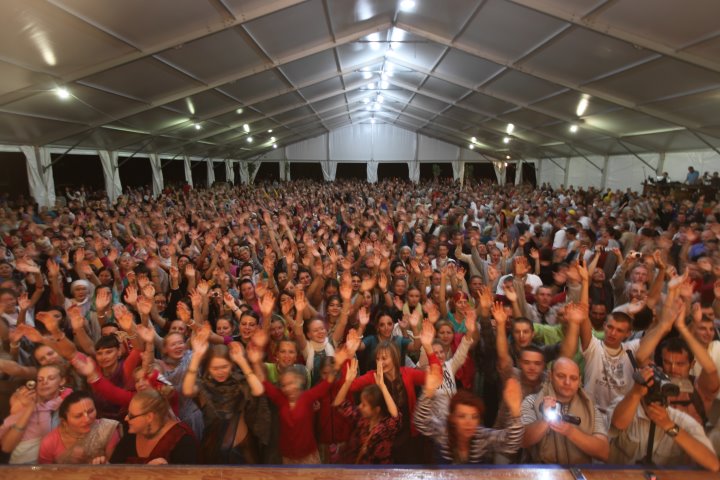ISKCON’s Biggest Festival: The Inside Story
By Devamrita Swami | Oct 07, 2011

If indeed the USA is the best democracy money can buy, then certainly Ukraine, the largest country wholly within Europe, is a democratic price-grabber’s flea market. Open-air, unvarnished, the affairs of any level of government, judicial, legislative, or executive are on sale, 24/7.
Slip your money under the vendor’s table. Then watch the police, courts, hospitals, and universities wobble and totter your way. First-world visitors from what are now known as the mature, industrial democracies can’t stomach this apparent mayhem.
Ukrainians, however, long reconciled to their system, often shrug it off as how life is in this world and as a form of wealth distribution that keeps everyone happy. If you want to get something done, it’s only fair, they often say, that everyone in the food chain, from the lowest clerk to the top bureaucrat, gets a bite. And why not point your finger at those piggy American bankers, who plunged the world into the Global Financial Crisis; yet how many have gone to prison?
During the Middle Ages, the territory of Ukraine was a mighty center of Slavic culture before the Mongols poured in and eradicated the population. Seven centuries of constant strife followed, as neighboring European powers took turns pummeling and dissecting the phantom Ukrainian nation. Then in the 20th Century came Stalin, who made the Mongol hordes look like sugar babes.
Obsessed with collectivizing Ukraine’s famed agrarian prowess, his policies of forced collectivization and land confiscation obliterated the food supply. Starvation, augmented by firing squads and mass exiles, decimated a land often considered Europe’s greatest breadbasket. Historians, still arguing over the total death toll, estimate that at least 25% percent of Ukraine’s population died in what is known as the Holodomor, or Ukrainian Holocaust.
In 2003 at the United Nations, 25 countries including Russia, Ukraine and United States, signed a joint statement on the 70th anniversary of the Holodomor with the following preamble:
“In the former Soviet Union millions of men, women and children fell victims to the cruel actions and policies of the totalitarian regime. The Great Famine of 1932-1933 in Ukraine (Holodomor), took from 7 million to 10 million innocent lives and became a national tragedy for the Ukrainian people.”
Now, however, the same perennially mauled territory is a chakra of eternal bhakti culture. Graced with over 8,000 devotees participating in over 120 ISKCON centers and formal congregational gatherings, Ukraine, though economically one of Europe’s poorest countries, is exceedingly wealthy in devotional service.
The crown jewel of ISKCON’s endeavors there is the annual weeklong festival, in September, on the Black Sea. It’s theme: selfless devotional service, performed with no material motivation or gain. Amazingly, for its weeklong bhakti extravaganza, spanning from predawn to near midnight, the festival charges no fee.
In 1996, when the festival began, 400 devotees attended. By 2002, the attendance had climbed to 1,800, as a yearly bevy of visiting international senior Vaishnavas led seminars and kirtans.
Each devotee paid a fee, in addition to accommodation, and received a plastic wristband allowing access to seminars, kirtans, and prasada meals.
After the 2008 festival, however, Niranjana Swami, an ISKCON Governing Body Commissioner, suddenly changed that approach. Walking at 5am to mangal-arti, the day’s first congregational chanting, he noticed devotees, who couldn’t afford the festival fees, stealthily trying to elude the Vaishnava security-guards and clandestinely join the kirtan.
Their sincere determination to rise so early and participate in the predawn chanting thoroughly moved his heart. Niranjana Swami began to rethink the festival’s concepts.
Out went the festival fees and enforcers checking for wristbands, national secretary Acyuta-priya das explains. The new policy: Come one, come all we’ll depend on Krishna and serve as many as show up.
Moreover, no longer would festival staff members receive any remuneration or expense compensation for their herculean, marathon efforts, all devotional service would be completely voluntary offerings of bhakti.
Upon registration, devotees are informed that the cost for festival prasada and programs averages approximately $40 per head, but everyone can pay what they can or want, whether nothing, less, or more.
The 2011 festival, just concluded Sept. 15, officially recorded 6,000 devotees attending – easily ISKCON”s biggest all-devotee event. Mystically, the festive accounts balanced, augmented by wealthy donors from both within Ukraine and abroad, inspired by the festival’s bold spiritual vision and expert management.
How do you feed breakfast and lunch to more than 6,000 guests? Every day a different major temple in Ukraine takes responsibility for the massive cooking. To my delight, the veteran, senior international guests could opt for especially healthy cuisine – even amaranth, quinoa, and heaps of marinated ginger.
This year’s international lineup of special guest speakers and kirtan leaders included Niranjana Swami, A.C. Bhaktivaibhava Swami, Prabhavishnu Swami, Indradyumna Swami, Prahladananda Swami, Bhakti Vijnana Goswami, Devamrita Swami, Bada Hari das, Yadubara das, Ganesh das, Dhanesvara das, Navina Nirada das, Caitanya Candra Charan das, Madhava das, Sarvatma das, and Devaki dasi.
Extending the festival’s policy of donate what you can from the heart, the huge festival gift shop decided to go the same route. Devotees could walk into the shop, pick out any devotional paraphernalia or clothing, and pay what they could or wanted. Amazingly the store turned a profit.
Whether from the registration donations or the gift shop, any surplus funds are directly plowed back into next year’s festival. With attendance growing by over 1,000 per year, a delightful problem presses: where to find a ent with floor that facilitates at least 7,000 eager Srimad Bhagavatam hearers and jubilant Hare Krishna kirtan jumpers.














